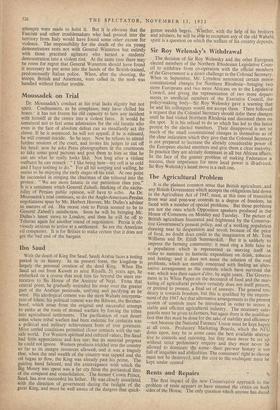The Agricultural Problem
It is the plainest common sense that British agriculture„and any British Government which accepts the obligations laid down in the Agriculture Act of 1947, must, at this time of transition from war and post-war controls to a degree of freedom, be faced with a number of special problems. But those problems are not the ones which Opposition speakers produced in the House of Commons on Monday and Tuesday. The picture of British agriculture frustrated and frightened by the Conserva- tive Government's present policy, and of a working population drawing near to desperation and revolt because of the price of food, no doubt does credit to the imagination of Mr. Tom Williams and Dr. Edith Summerskill. But it is unlikely to impress the farming community; it must ring a little false to a population which is represented as starving itself in order to maintain its fantastic expenditure on drink, tobacco and betting; and it does not assist the solution of the rcal problems, which are mostly concerned with finding an alter- native arrangement to the controls which have survived the • war, which was their raison d'etre, by eight years. The'Govern- ment in its White Papen on the decontrol of food and the mar- keting of agricultural produce certainly does not itself present, or pretend to present, a final set of answers. The general ten- dency is towards freedom, but this is qualified by the require- ment of the 1947 Act that alternative arrangements to the present system of controls must be introduced in order to secure a stable and efficient agricultural industry. The necessary safe- guards must be given to farmers, but again there is the qualifica- tion that this must be done for the sake of stability and efficiency —not because the National Farmers' Union must be kept happy at all costs. Producers'. Marketing Boards, which the NF U dotes upon, may be in some cases the best available alterna- tive to Controls and rationing, but they must never be set up without strict preliminary enquiry and they must never be allowed to dominate tbe scene—their pre-war history is too full of iniquities and absUrdities. The consumers' right to choose must not be destroyei, and the cost to the exchequer must be kept under control.
































 Previous page
Previous page